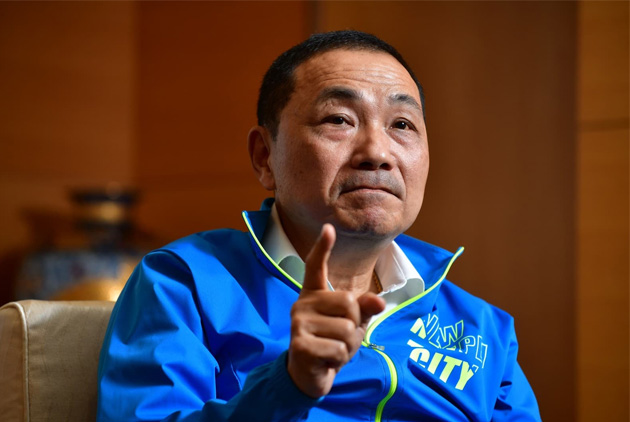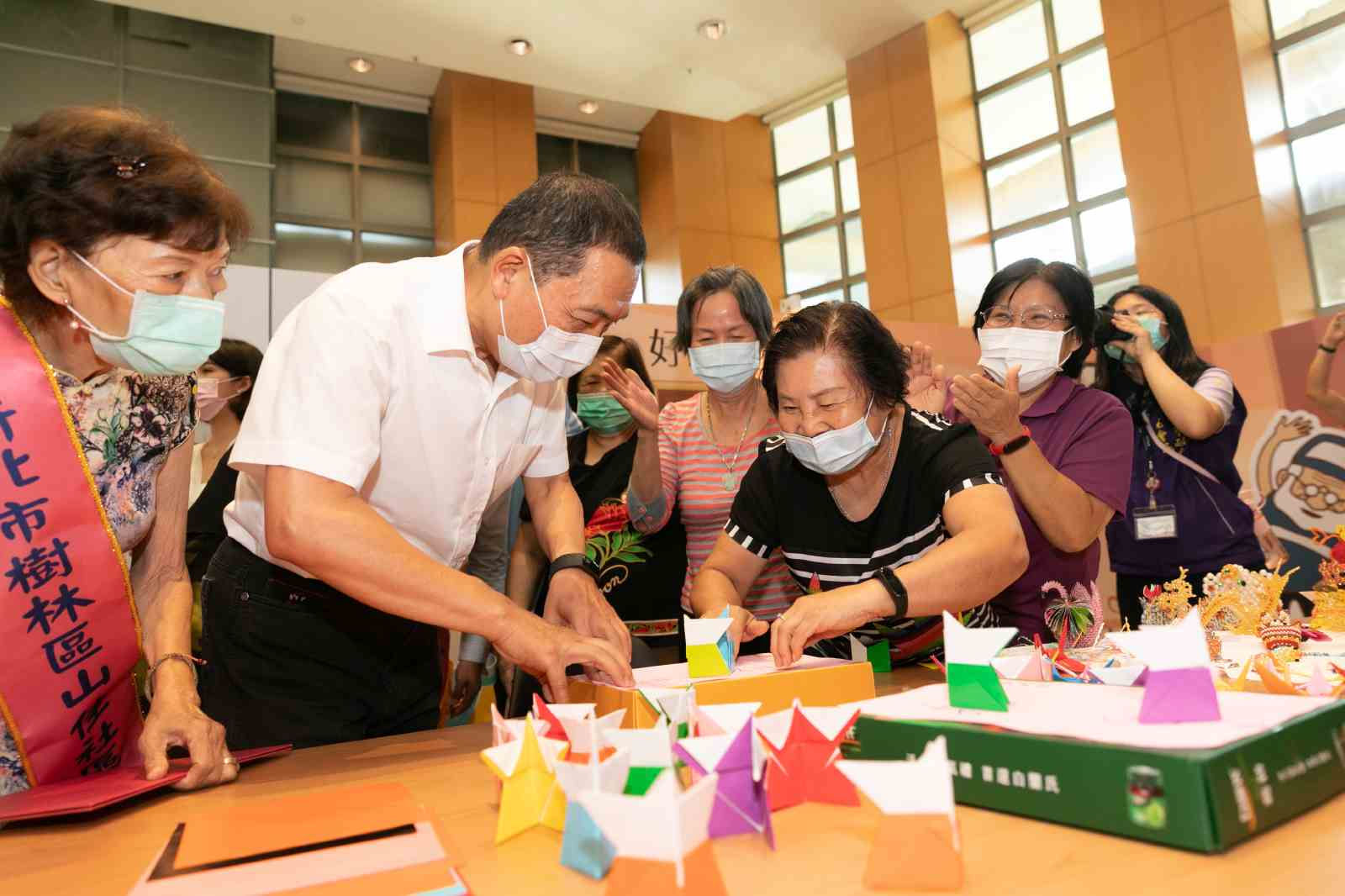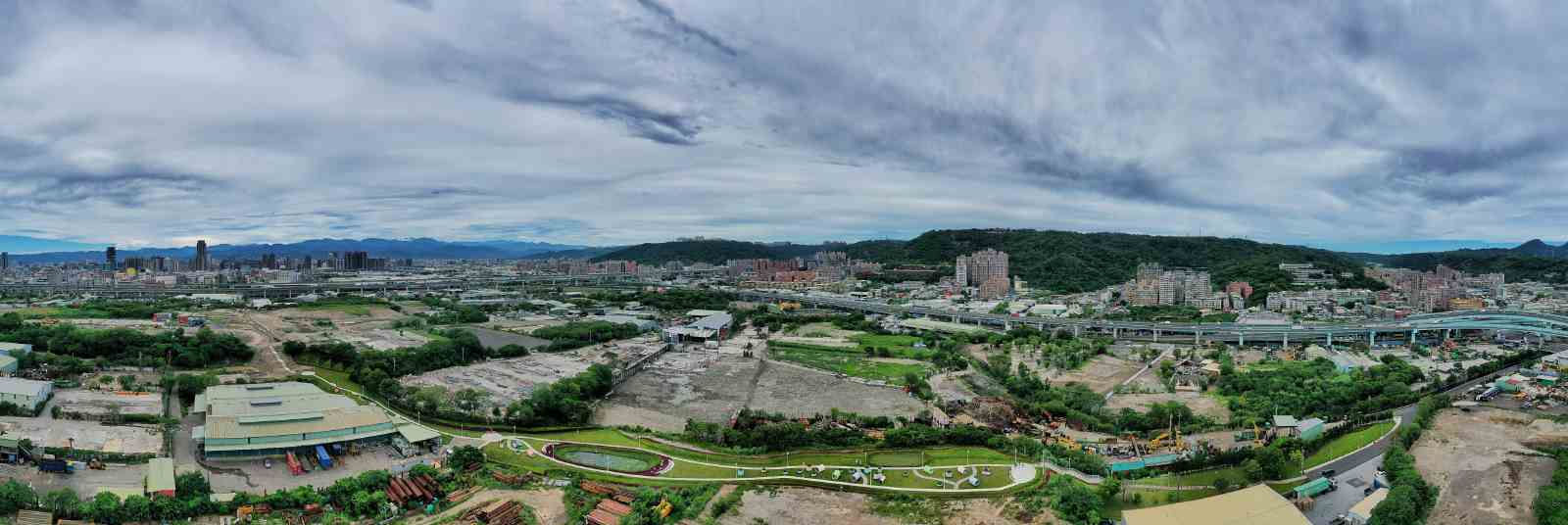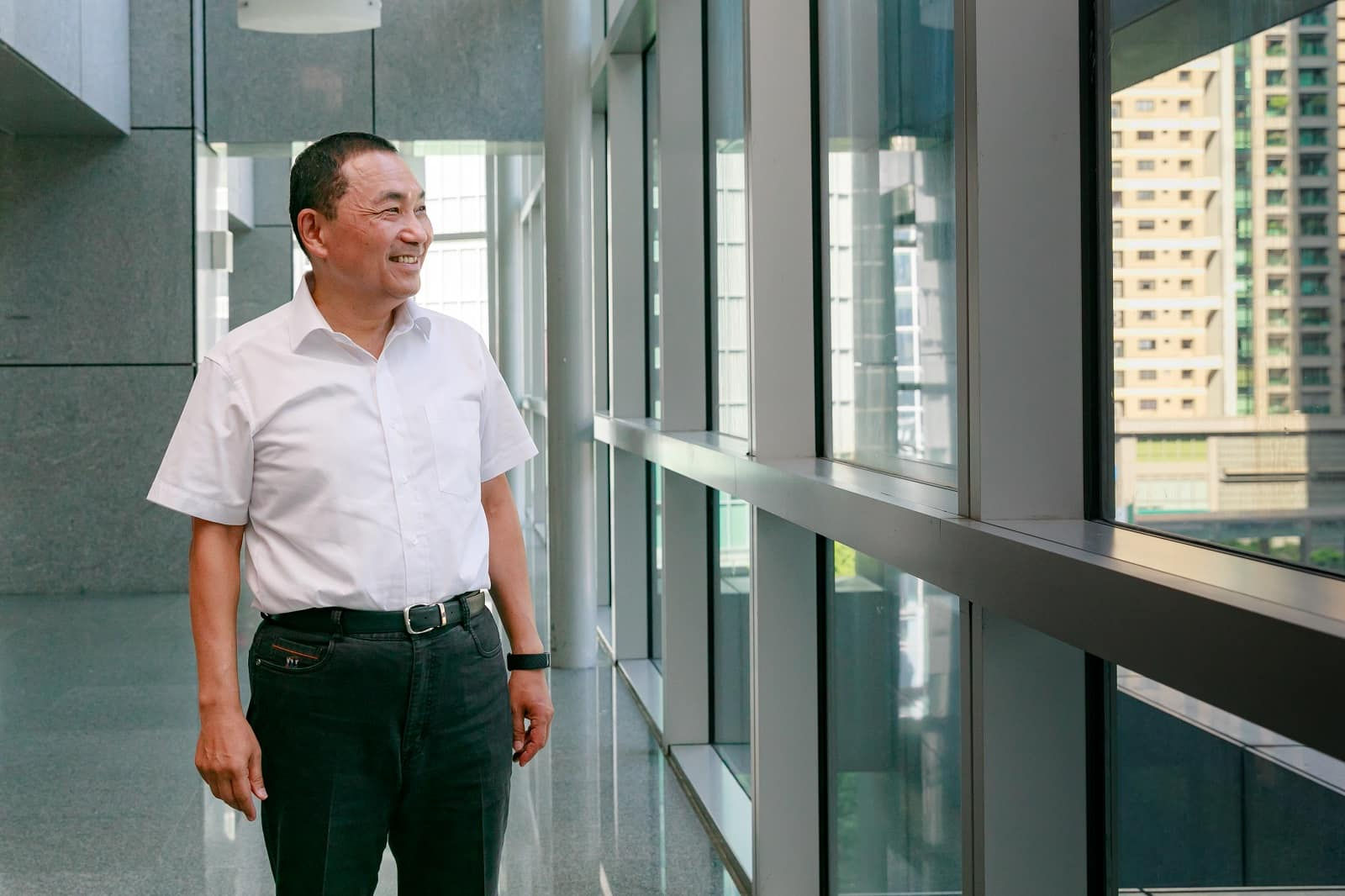The Cop Who Became Taiwan’s Top-rated Mayor

Source:Kuo-Tai Liu
New Taipei Mayor Hou Yu-ih has been rated the most popular mayor among Taiwan’s six biggest municipalities. The honor may have much more to do with the lessons he learned as a boy and during his many years with law enforcement than with any specific policy.
Views
The Cop Who Became Taiwan’s Top-rated Mayor
By Rebecca LinFrom CommonWealth Magazine (vol. 706 )
The more chaotic an era, the greater people’s yearning for a hero.
Since the great hope of the pan-blue (pro-Kuomintang) camp, former Kaohsiung Mayor Han Kuo-yu, was recalled in June, New Taipei Mayor Hou Yu-ih has suddenly emerged as the strongest of the KMT’s local government chiefs and the biggest potential thorn in the side of the ruling Democratic Progressive Party (DPP).
For much of his 30-year career with the police, Hou spent his time with a gun strapped to his waist, pursuing criminals wherever they were. Today, he is the one under hot pursuit by camera-toting reporters who pepper him with the same question: “Are you going to run for president?” The question is being asked even though Taiwan’s next presidential election is still three and a half years away; Hou has yet to complete even half of his four-year term that started at the end of 2018.
Pig-catching Experience Paying Off
In a recent interview, Hou seemed more confident and laid back than he has been in the past; he talked about being shaped by his unusual “pig-catching” philosophy and how catching pigs helped him hone his skill in “catching” people.
Working with his father from the time he was young, Hou was usually busy either helping man a pork stall in a local market or catching and killing pigs in areas surrounding his hometown of Puzi in Chiayi County.
He learned to take on wild pigs at the age of seven, figuring out how to observe the environment and gauge the size of the pig and how it was moving, then calculating when to pounce and which leg to take out to bring it down, and finally jumping on it to pin it to the ground while using a hemp rope to bind its hind legs together.
That strategy for catching pigs was similar to the way he apprehended suspects. As a policeman, Hou would go face-to-face with criminals in life-and-death struggles, requiring agility and the need to bring a suspect down within three minutes to avoid exhaustion. As with pigs, a key tactic was cutting the legs out from under the suspect and then quickly tying them up, leaving Hou’s human quarry as immobile as the pigs he once chased.
Those skills and his years of experience in handling cases gave him a keen feel for human nature. While forensic evidence was important, solving crimes often came down to those instincts.
And those life experiences – growing up in a traditional market, serving as a policeman who had to navigate between the underworld and influential officials, and finally entering the political fray as New Taipei deputy mayor in 2010 – have been leveraged to the fullest by Hou since winning election as mayor of New Taipei in 2018 and taking over as the head of a city of four million people.
Whenever he attends a public event, he insists on entering the venue from where people are seated, greeting and shaking hands with them before stepping on stage.
“I’d rather spend an extra 10 minutes interacting with people. It’s more useful than speaking on stage for 20 minutes,” he says. “I’m able to have a stage only because of the people in the audience. You can’t put the cart before the horse.”
Perhaps because he is not part of a political faction and does not have backers he has to answer to, Hou has a better understanding of building a grassroots foundation than most other politicians.

“His background is that of a policeman, and the police have close contact with people at the grassroots level, so he inherently has a good feel for dealing with and speaking to people,” observed DPP New Taipei city councilor Ho Po-wen.
But Hou’s popularity can be traced to more than just his personal touch. Much of his success, according to Ho, rests on his strategy to visit all 29 of the city’s districts, hold seminars with ward chiefs to listen to the problems people are facing in their neighborhoods, and then use his clout as mayor to solve those issues.
From Banqiao and Xinzhuang to the west of Taipei to Jinshan, Wanli and Ruifang on Taiwan’s northern coast, Hou has completed two full rounds of the expansive city. A seminar in a ward can last at least three to four hours, but the mayor generally attends them from start to finish, according to Ho.
The success of those appearances resides substantially in the strict management structure that exists behind the scenes. There are 1,032 wards in the city’s 29 districts covered by 28 city agencies and departments. Every question raised by a ward chief at a seminar is listed and forwarded to the agency concerned, and the city’s Research, Development and Evaluation Commission (RDEC) tracks and evaluates the city’s response. These different layers of management proceed simultaneously to stay on top of community issues.
“With the mayor personally helping ward chiefs solve whatever problems they have, the heads of city agencies are under a great deal of pressure,” said Lin Feng-yu, the head of the city’s RDEC, who was previously a high-ranking officer in the Criminal Investigation Bureau and has known Hou for more than 20 years.
The RDEC not only follows up every week on the progress being made on specific issues, it also conducts satisfaction surveys, calling ward chiefs before the next seminar in their ward is held to get their opinion on the city agency’s handling of the problem and its service attitude.
Hou’s participation in many of these events lets city residents know that he cares about them, but no matter how many events he attends during his term as mayor, he will never come in direct contact with more than a few hundred thousand people, far short of the four million people living in New Taipei. So for his achievements as mayor to resonate with all of his constituents, they also have to be conveyed through mass media and by word of mouth through ward chiefs, city councilors and social groups.
Ultimately, however, Hou understands that the starting point for everything is people’s “hearts and minds”.
Garbage Mountain
The clearing of a “garbage mountain” in Wugu has been a perfect example. Hidden amid the 170-hectare area covered by the mountain of garbage are 677 factories, most of them recycling plants, earth dump sites, heavy machinery depots and unregistered factories. This huge garbage dump has been an environmental nightmare, with garbage transported during the day, leaving dust everywhere, and then incinerated at night, filling the air with a putrid smell.
After more than a year of work, this one-time wasteland ignored by every public authority has been transformed into five green parks. Of the nearly 700 factories on the site, 163 have successfully applied for a permit to continue operating, while the others are required to shut down by the end of the year or be torn down by the city.

“He personally went to the front lines to arrest violators and tear down illegal structures, with the complete support of prosecutors, police and investigators,” said Chiu Ching-pin, the city’s deputy secretary-general, talking about Hou’s hands-on role in the process.
Chiu has been responsible for bringing together more than 20 agencies to establish a task force to promote the Wugu garbage mountain pilot project, and the task force has required city agencies to visit each factory to explain the pilot program. In the process, some city representatives faced threats from crime gangs and pressure to back off from elected officials, but the city did not give in.
“A colleague went to audit a factory and was cornered. The mayor went through intermediaries to warn those delivering the threats to ‘not even think about touching city workers,’” said a Hou aide. Elected officials have tried at times to intercede on behalf of some of the illegal factories, “but when the time comes, the structures will be torn down, with no exceptions,” according to the aide.
“Whether criminal gangs or elected officials, they are all afraid of him (Hou),” said Liu Ho-jan, another New Taipei deputy secretary-general who has served in the local government since the area, then known as Taipei County, was led by Yu Ching in the first half of the 1990s.
The lands occupied by the garbage mountain in Wugu and the Wenzizhen area, separated by the No. 1 National Freeway, are critical because they represent the heart of New Taipei’s development puzzle.
“Cities that are internationally competitive have populations of at least 10 million people. Taipei, New Taipei, Keelung, Taoyuan and Yilan combined are right around 10 million,” Hou said.

But New Taipei, which is at the center of those 10 million people, has an appearance that does not live up to the city’s central standing, Hou said, unhappy that when you get off the freeway in parts of his city just west of Taipei, all you see is an ugly mishmash of corrugated steel structures.
To reverse the situation, Hou initiated an urban image and landscape rehabilitation project to simultaneously give a facelift to three axes of New Taipei – Banqiao, Xinzhuang and Sanchong – while also drawing in surrounding areas. Hou hopes the project will turn New Taipei into a modern city that lives up to international norms. Once the Wugu garbage mountain project is completed next year, attention will turn to Wenzizhen.
Scoring Points for Nonpartisanship
“We want the best for Taipei, Taoyuan, Yilan and Keelung. If they do well, we’ll do well,” Hou said.
Perhaps because of that philosophy, Hou has avoided party partisanship in favor or working with neighboring counties and cities. He has hiked with Taoyuan Mayor Cheng Wen-tsan of the DPP and sold tuna with Yilan County chief Lin Zi-miao of Hou’s KMT.
City councilor Ho described Hou as a pragmatist. While Hou’s predecessor, Eric Chu, also of the KMT, was willing to spar with the central government from time-to-time, Hou knows the city depends on the central government for many resources and does not see any benefit to taking it on, Ho said.
“But to be honest, Hou has yet to put forth any eye-catching projects or appeals. He is mostly carrying out Chu’s policies, but has not done enough long-term planning for New Taipei,” said Ho, who is with the DPP.
Having been in office for less than two years, however, Hou may need more time to devise and implement a longer-term blueprint he can call his own.
Eschewing Titles
“I have been a civil servant, and reached the highest possible position before taking part in an election when most people would have retired. To me, life is about self-fulfillment and forging your own values. Even though I’m mayor, that’s just a title. How you position yourself is more important than a title,” Hou said.
Hou has held 15 different positions during his career; he started as a police officer, and rose to become the head of the National Police Agency and president of Central Police University before emerging as mayor of Taiwan’s biggest city. But to him, positions are temporary; more important is living in the moment and taking full advantage of the opportunities at hand.
That may be the most important lesson drawn from his pressure-packed 30-year career as a law enforcement officer – coming to the realization that the “next moment” could disappear at any time, and making the best of the present.
Have you read?
♦ Can the DPP’s Favorite Son Bring Glory to Taoyuan?
♦ Local Leaders Approval Survey Hints at Taiwan’s Future
♦ Taipei Retains Top Spot, So Why Are People Leaving?
Translated by Luke Sabatier
Edited by TC Lin
Uploaded by Penny Chiang






